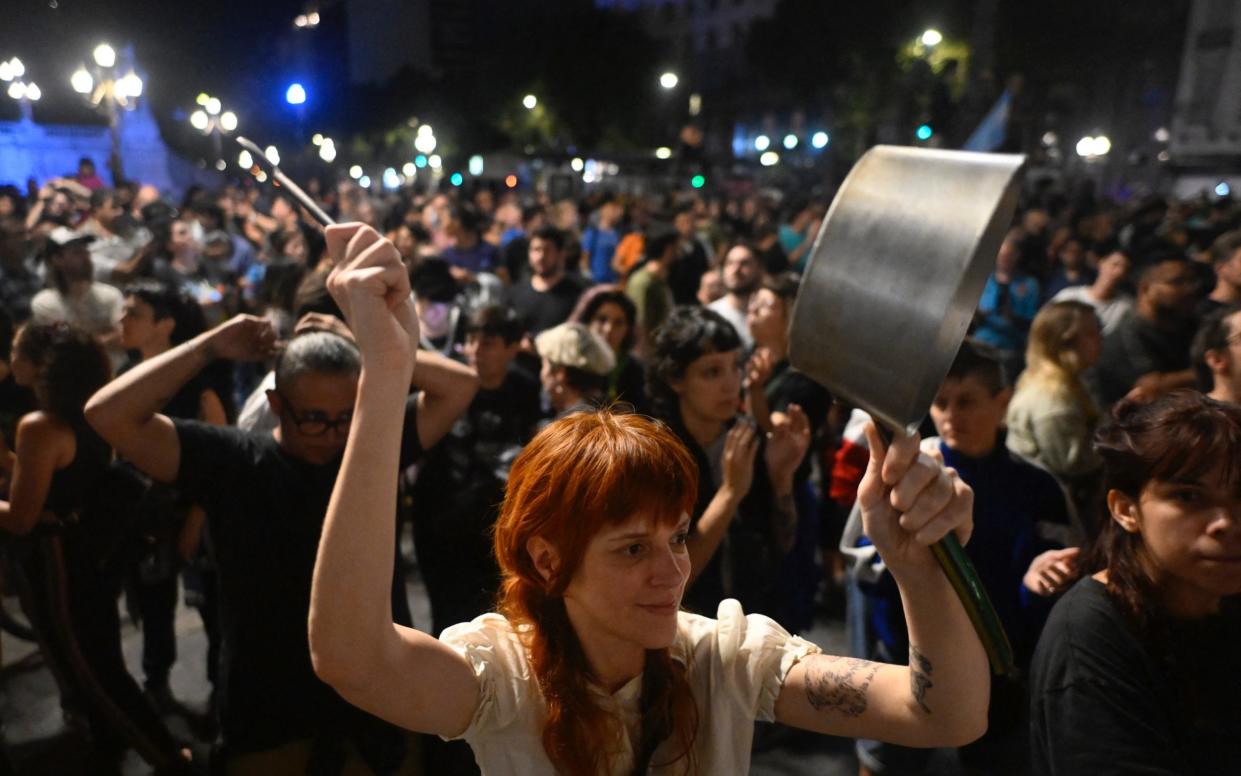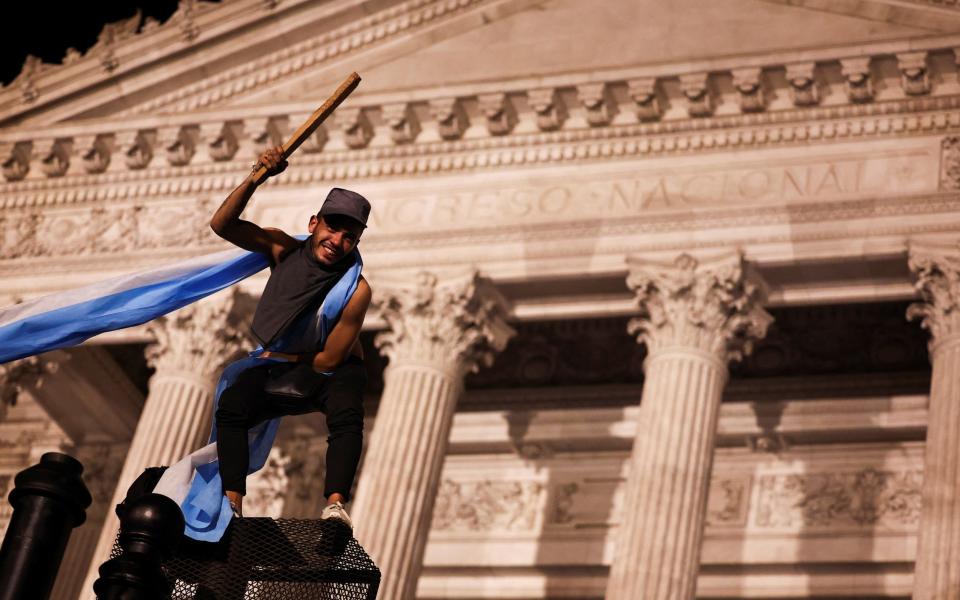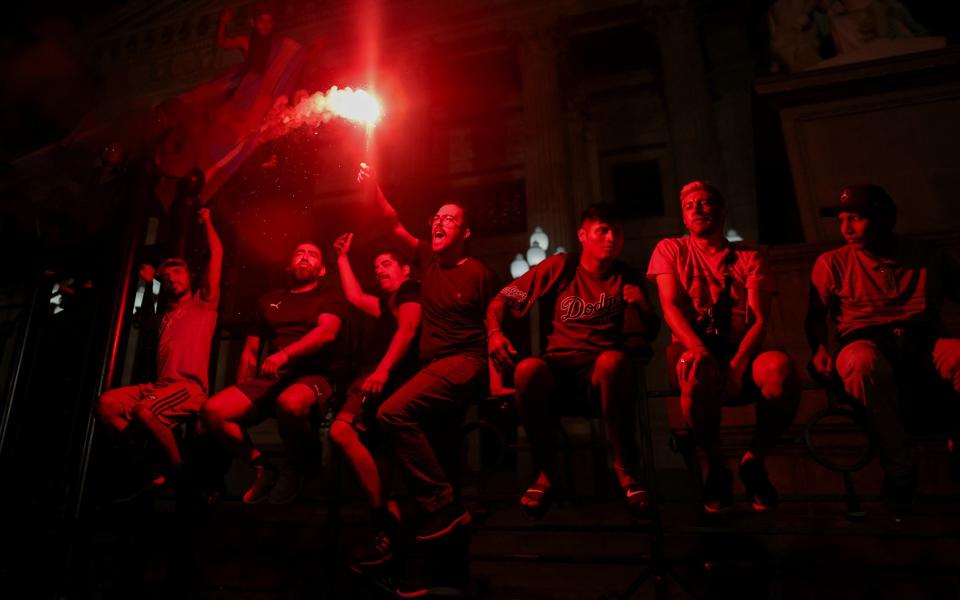Argentines bang pots to protest against Milei’s economic revolution

- Oops!Something went wrong.Please try again later.
Argentina’s new president unveiled an emergency decree aimed at deregulating the country’s inflation-wracked economy on Wednesday as thousands took to the streets of the capital to protest against his plans.
Javier Milei, who took office in early December on a promise to slash public spending, mandated some 300 changes that will earmark many government companies for privatisation, and loosen protections for renters, employees and shoppers.
The Right-wing libertarian announced the moves for South America’s second-biggest economy just hours after Argentines descended on central Buenos Aires en masse to vent their anger over the new leader’s agenda.
Undeterred by the demonstration, Mr Milei said his goal was to “start rebuilding” the country as he made a televised address to the nation setting out his emergency decree.
Measures include deregulating mining and other industries. Regulations covering the property rental market, export customs arrangements, land ownership and food retailers will be struck down.
The decree will also modify existing rules within Argentina’s aviation, healthcare, pharmaceutical and tourism sectors in a bid to encourage greater competition.
In a pre-recorded broadcast, Mr Milei said: “Today we are taking our first step to end Argentina’s model of decline.
“I have signed an emergency decree to start to unpick the oppressive institutional and legal framework that has destroyed our country,” he added.
“The goal is start on the road to rebuilding our country, return freedom and autonomy to individuals and start to transform the enormous amount of regulations that have blocked, stalled and stopped economic growth in our country.”
After the announcement, people in some neighbourhoods of Buenos Aires banged pots to show their disapproval.
“Cacerolazos” — noisy anti-government protests in which people bang casserole pots — have been symbolic in Argentina in recent years when people want to express their anger.
Hundreds of protesters also staged an impromptu rally outside Argentina’s congress building, shouting: “Our country isn’t for sale!”

Hours earlier, thousands of people took to the streets of the capital in the first big protest of Mr Milei’s administration, which last week devalued the Argentine peso by 50 per cent, and cut energy and transportation subsidies.
The measures come amid soaring inflation of over 160 per cent and rising poverty rates.
Authorities directed protesters away from roads and onto pavements so traffic could pass, after a government warning against blocking streets.
Mr Milei’s administration has said it will allow protests, but threatened to cut off state benefits to anyone who blocks thoroughfares. Marchers on Wednesday were forbidden to carry sticks, cover their faces or bring children to the protest.
Members of his coalition government have warned demonstrators to expect “prison or a bullet” after authorities brought in a “protocol” last week ostensibly aimed at maintaining public order that allows federal forces to block demonstrators from holding disruptive events.
The new rules also authorise the police to identify — through video or digital means — people protesting and obstructing public thoroughfares. It can charge them for the cost of mobilising security forces.
Some social organisations have said that the protocol goes too far and effectively criminalises the right to protest.

Eduardo Belliboni, one of the organisers of Wednesday’s demonstration, said protesters faced “an enormous repressive apparatus”.
Mr Belliboni’s Left-wing Polo Obrero group has a long history of leading street blockages and he claimed large-scale marches wouldn’t fit on the sidewalks.
“This [the street] is where people move around all over the world... where are we going to fit 50,000 people?” he said.
A recent poll by the University of Buenos Aires’ Observatory of Applied Social Psychology said 65 per cent of those surveyed agree with banning street blockages.
Milei, a 53-year-old economist who rose to fame on television with profanity-laden tirades against what he called the political caste, became president with the support of Argentine’s disillusioned with the economic crisis.

